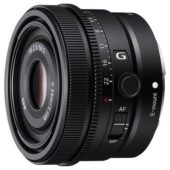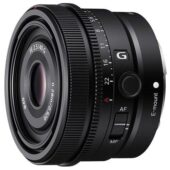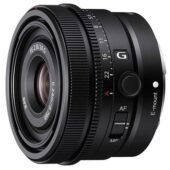The Sony FE 50mm f/2.5 G, FE 40mm f/2.5 G, and FE 24mm f/2.8 G are over priced in lenstips’ estimation, but I think the real draw is the trio’s compact size. Below you can see a summary of their lenstips’ and pro/cons, but the full articles
Sony FE 50mm f/2.5 G: B&H Photo / Amazon / Adorama
I have no doubts the Sony FE 50 mm f/2.5 G is a well-put-together lens and if you decide to purchase it you will enjoy its performance. Still the biggest problem is its price, amounting to $600, and a very strong in-house competition. Practically for the same amount of money you can buy the Zeiss Sonnar 1.8/55, a lens faster aperture-wise and very solid; it’s true it won’t provide photos as sharp as those produced by the new Sony but it is an option well liked and appreciated by Sony FE system users; additionally its aperture allows you to play with depth of field in a more creative way. Those who have a limited budget might be tempted by the Sony FE 50 mm f/1.8, a faster lens that is also four times cheaper. –Lenstips
Pros:
- solid and sealed mechanical construction,
- excellent image quality in the frame centre,
- very good image quality on the edge of the APS-C sensor,
- practically zero lateral chromatic aberration,
- moderate distortion,
- properly corrected coma,
- negligible astigmatism,
- moderate vignetting on the APS-C sensor,
- very good performance against bright light,
- quite fast, silent, and accurate autofocus.
Cons:
- some problems with longitudinal chromatic aberration,
- high vignetting on full frame,
- exorbitant price.
Sony FE 40mm f/2.5 G: B&H Photo / Amazon / Adorama
One glance at the pros and cons list and you know that you deal where with a well-put-together, efficient lens. It would be difficult to have any serious reservations concerning optical or mechanical properties of the tested instrument and, I suppose, it’s the main point that should be emphasized in the summary. If you decide to buy it you won’t be disappointed for sure. – Lenstips
Pros:
- solid and sealed mechanical construction,
- excellent image quality in the frame centre,
- very good image quality on the edge of the APS-C sensor,
- slight lateral chromatic aberration,
- lack of problems with spherical aberration,
- moderate distortion,
- properly corrected coma,
- slight astigmatism,
- moderate vignetting on the APS-C sensor,
- good performance against bright light,
- quite fast, silent and accurate autofocus.
Cons:
- a bit of problems with longitudinal chromatic aberration,
- high vingetting on full frame,
- exorbitant price.
Sony FE 24mm f/2.8 G: B&H Photo / Amazon / Adorama
Out of the group of three new models, presented by Sony, the 2.8/24, the 2.5/40, and the 2.5/50, the first one was perhaps the most difficult to design. Those difficulties are reflected in the results of our tests. The list of assets is long, with several crucial points – we mean here especially a very good performance in the frame centre, including the maximum relative apertue, and an excellent performance against bright light, so difficult to achieve with such a wide angle of view. – Lenstips
Pros:
- solid, weather-sealed mechanical construction,
- very good image quality in the frame centre,
- sensible image quality on the edge of the APS-C sensor,
- very good correction of longitudinal chromatic aberration,
- slight astigmatism,
- moderate vignetting on the APS-C sensor,
- excellent performance against bright light,
- fast, silent, and accurate autofocus.
Cons:
- some problems with lateral chromatic aberration,
- high vignetting on full frame,
- huge distortion on RAW files,
- exorbitant price.
Follow SonyAddict on Facebook, Twitter, Instagram, and YouTube
Plus our owners’ groups
Sony a9 Owners Group
Sony a7 Owners Group


